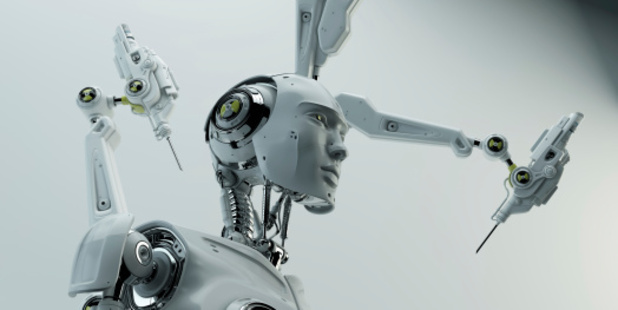New report warns 50 per cent of jobs will be redundant by 20
Source: Thinkstock
 Artificial intelligence will mean that many jobs will be done by computers. Photo / Thinkstock
Artificial intelligence will mean that many jobs will be done by computers. Photo / Thinkstock
From self-driving cars to carebots for elderly people, rapid advances in technology have long represented a potential threat to many jobs normally performed by people.
But experts now believe that almost 50 per cent of occupations existing today will be completely redundant by 2025 as artificial intelligence continues to transform businesses.
A revolutionary shift in the way workplaces operate is expected to take place over the next 10 to 15 years, which could put some people's livelihoods at risk.
Customer work, process work and vast swatches of middle management will simply 'disappear', according to a new report by consulting firm CBRE and China-based Genesis.
'Experts predict that 50 per cent of occupations today will no longer exist by 2025 as people will take up more creative professions,' said Martin Chen, Chief Operating Officer of Genesis.
'This means that jobs will evolve and so will real estate development.'
Workspaces with rows of desks will become completely redundant, not because they are not fit for purpose, but simply because that purpose no longer exists, according to the report.
'The next fifteen years will see a revolution in how we work, and a corresponding revolution will necessarily take place on how we plan and think about workplaces,' said Peter Andrew, Director of Workplace Strategy for CBRE Asia Pacific.
A growing proportion of jobs in the future will require creativity intelligence, social skills and the ability to leverage artificial intelligence.
'And for most people that will be a route to happiness and fulfilment,' the report states.
'For many of us, artificial intelligence will be a tool to undertake tasks of a scale and complexity that were once unimaginable but which are now eminently possible and hugely rewarding.'
The report - Fast Forward 2030: The Future of Work and the Workplace - is based on interviews with 200 experts, business leaders and young people from Asia Pacific, Europe and North America.
Data in the US suggests that technology already destroys more jobs than it creates, as GDP has been able to grow faster than employment since 2000.
But the report states: 'Losing occupations does not necessarily mean losing jobs - just changing what people do.'
Growth in new jobs could occur as much through crowd sourced freelancers as within the bounds of the corporation, according to the research.
'The biggest wild card will be the emergence of 20 to 40 person companies that have the speed and technological know-how to directly challenge major corporations,' it states.
A 2014 report by Pew Research found 52 per cent of experts in artificial and robotics were optimistic about the future and believed there would still be enough jobs in the next few decades.
The optimists envisioned "a future in which robots and digital agents do not displace more jobs than they create," according to Aaron Smith, the report's co-author.
Microsoft's Jonathan Grudin told researchers that: "Technology will continue to disrupt jobs, but more jobs seem likely to be created.
'When the world population was a few hundred million people there were hundreds of millions of jobs.
'Although there have always been unemployed people, when we reached a few billion people there were billions of jobs. There is no shortage of things that need to be done and that will not change.'
Oxford University researchers have ranked the occupations most in danger of being replaced by computers and robots, including telemarketers, insurance underwriters and watch repairers.
Some of the least likely to be replaced are therapists, audiologists and choreographers.
Top 20 jobs at most and least risk of being replaced by robots
Jobs most at risk of being replaced
1) Telemarketers
2) Title Examiners, abstractors and searchers
3) People working in sewers
4) Mathematical technicians
5) Insurance underwriters
6) Watch repairers
7) Cargo and freight agents
8) Tax preparers
9) Photographic process workers
10) New accounts clerks
11) Library Technicians
12) Data entry keyers
13) Timing device assemblers
14) Insurance claims
15) Brokerage clerks
16) Order clerks
17) Loan officers
18) Insurance appraisers
19) Umpires, Referees, and sports officials
20) Tellers
Jobs least at risk of being replaced
1) Chiropractors
2) Biochemists and biophysicists
3) Electronics engineers, except computers
4) Directors, religious activities and education
5) Supervisors of correctional officers
6) Art directors
7) Orthodontists
8) Interior designers
9) Producers and directors
10) Photographers
11) Physical therapists
12) Fashion designers
13) Materials engineers
14) Materials scientists
15) Soil and plant scientists
16) Health diagnosing and treating practitioners
17) Civil engineers
18) Physical therapist assistants
19) Architects, except Landscape and naval
20) Environmental Engineers
| }
|